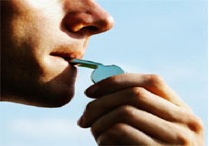Guest blog by Dr Christopher Hughes:
 VS.
VS.
A footballer comes back from a trip abroad having undergone some questionable intervention from a dubious practitioner using an unconventional, non-evidence-based rationale (see example here )….
An independent healthcare practitioner recommends a costly series of procedures for an athlete for an indication when current evidence points to the ineffectiveness of this treatment….
A runner presents with unexplained physical symptoms only for you to eventually find out that she is taking a nutritional supplement from an unregulated healthcare practitioner which has caused hepatotoxicity….
Hands up all those of us practising in Sport and Exercise Medicine (SEM) who have seen a patient who has been previously managed by another healthcare practitioner in a questionable manner?
Anecdotal evidence suggests that there are a plethora of practitioners of dubious training backgrounds and quality involved with caring for sport and exercise participants — especially working within elite sport, and some of whom use a variety of unconventional, non-evidence-based ‘treatment’ modalities (see Franklyn-Miller et al, 2011).
Certainly, it seems that issues related to unconventional practice are widely discussed amongst the SEM fraternity on an informal basis. Recognition is one thing, but are we effective at safeguarding our patients from such practice and the associated harm?
Adverse patient outcomes may occur directly, for example from the result of a treatment modality itself, or indirectly, for example as the result of a more appropriate investigation or management plan being instigated too late due to persistence with an ineffective option.
At best, some treatment modalities employed by some healthcare practitioners may be not particularly harmful but perhaps ineffective or costly. Whereas at worst some interventions may cause harm, for example repeated inappropriate steroid injections associated with subsequent chronic infection or tendon rupture.
There are clearly defined safeguarding and whistleblowing policies within the UK National Health Service clinical governance procedures. However, in the fragmented world of SEM and elite sport healthcare there are a wide variety of practitioners involved with those who participate in sport and exercise. They may be working in a broad variety of settings, each operating within a different particular governance framework, with some perhaps subject to no particular healthcare governance at all within their own field of practice. Elite sportsmen and women are perhaps especially vulnerable to possible harm or exploitation arising from those practitioners who employ unconventional methods in their management.
So how do we effectively address our concerns in order to protect our patients from harm and to foster an environment of excellence in healthcare within the field of SEM ?
A forthcoming BJSM editorial by Hughes explores the issues of safeguarding and whistleblowing in SEM. In the meantime, we would be interested to hear of your experiences and comments relating to these topics. Please post these in the comments box below.
Dr Christopher Hughes BSc (Hons) MBBS MRCGP FFSEM (UK) MFSEM (Eire) MSc PGCME FHEA MAcadMEd, is a
Specialist in Sport and Exercise Medicine and General Practitioner Senior Fellow in Medical Education, Barts and The London NHS Trust Club Doctor, Leyton Orient FC
